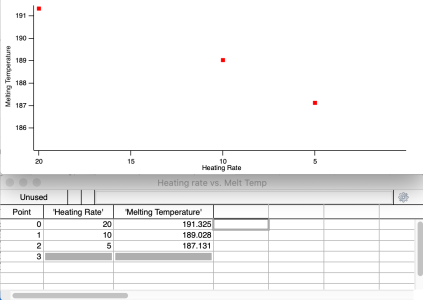
Very very beginner question
Hi everyone,
I am very new to Igor and analysis programs in general, excel is a challenge for me.
I would like to extrapolate my few data points to zero, that's it.
So if someone can kindly explain it to me in a simple way, I would be eternally grateful.
I know it is a simple question but I tried everything in curve fitting and quick fit to no avail.
And if you have any suggestions for where to start learning Igor and what I need to catch up to its advanced features, I would really appreciate it.








Here is how you do it:
1) Scale the bottom axis of the graph so that it includes x=0. For this, double-click the x-axis and go to the Axis Range tab to set everything up.
2) Go to Analysis => Curve Fitting
3) Choose Line as function and your data as X and Y respectively (activating the 'From Target' should mostly set this up for you)
4) Go to the Output Options tab and activate X Range Full Width of Graph
5) Do the fit. The fit line is drawn down to x=0.
This of course just gives you an optical representation of the x-intercept. If you want a precise number, then you would need to calculate the x-intercept yourself from the fit parameters (which are slope and y-intercept).
If you want to learn more about using Igor, the official manual is the way to go. There is actually a Guided Tour at the beginning, which you absolutely should go through to get up to speed. Either open the PDF manual or use the one inside the program (press F1).
April 14, 2022 at 01:42 am - Permalink
A plot of melting temperature vs heating rate is likely to raise curiosity around here. Do you have some idea of the relationship you expect? Surely not linear.
April 14, 2022 at 05:06 am - Permalink
Help->Help Topics->Getting Started is the guided tour in Igor Pro. This is a good and relatively short introduction into Igor Pro.
April 14, 2022 at 08:47 am - Permalink
In reply to Here is how you do it: 1)… by chozo
@Chozo Thanks a lot, it worked, I calculated the exact number as you suggested.
Unfortunatly, the official manual did not help. I tried (DisplayHelpTopic "Extrapolating a Fit After the Fit is Done"), went step by step but it did not work. I know it's me who lacks the experience, it's like searching for something without knowing its name.
Thanks again, have a great day.
April 14, 2022 at 08:53 pm - Permalink
@Tony It's not a linear relation but I only have these three points so I went with linear. Do you suggest something else?
April 14, 2022 at 08:59 pm - Permalink
Great that it worked for you. I tested the method written under "Extrapolating a Fit After the Fit is Done" as well and it worked. If you want to discuss this further, could you please give a bit more details what did not work for you? But since you already got the result, this is probably not needed.
The manual is a great help, but more often than not only helps you in an effective way if you know what you are looking for. In any case, you should set an hour or so aside to do the guided tour! If you work a lot with fits, you might want to read the curve fitting chapter as well. This will speed up your work a lot down the line.
If you already know that the relation is not linear, then do you know the equation? You can construct a fit from that to get a more realistic result. But with just three data points it will be difficult to get a good result anyway.
April 14, 2022 at 09:53 pm - Permalink
In reply to @Tony It's not a linear… by neima.allah.hosni
No, I don't have a suggestion, and I don't know anything about your data - what is being measured and how it is measured, the timescale of the measurements, how the quantities are defined. In short, without knowing something about the chemistry and physics of the process there's not much anyone can say.
April 15, 2022 at 12:11 am - Permalink
In reply to Thanks a lot, it worked, I… by neima.allah.hosni
If you can tell us what didn't work, maybe we can improve it. In fact, sometimes things get a bit out of date- we simply don't have enough people here to really do a thorough review of the manual on a regular basis. It's rare, though, for things in the manual to be so obsolete that they don't work.
April 15, 2022 at 10:23 am - Permalink